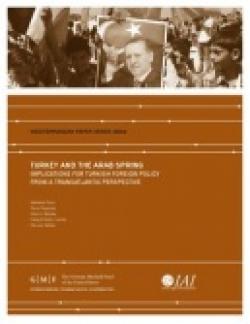Turkey and the Arab Spring. Implications for Turkish Foreign Policy from a Transatlantic Perspective
The Arab Spring reveals a number of contradictions and constraints as well as opportunities for Turkish foreign policy, all of which are of key relevance both to Turkey and to its transatlantic partners. The inconsistencies in and weaknesses of Turkish foreign policy, particularly when mapped against the stances of the European Union (EU) and the United States, may be viewed as by-products of a more proactive Turkish role in its southern neighborhood. The Arab Spring has revealed the inherent tension between the normative and realpolitik dimensions of Turkish foreign policy. The Arab Spring has also revealed that Turkey’s “zero problems with neighbors” has rested largely on improved ties with specific leaders. Finally, the Arab Spring has revealed that Turkey’s activism in the Middle East, and in particular its prolific mediation activities, have been as much contextual as actor driven. In the medium and long-term, a changing Middle East may present Turkey with important opportunities, to be seized alongside its transatlantic partners. Rather than a black-and-white model of a pro-Western Muslim secular democracy, Turkey may offer a number of different models and ideas to inspire change in its southern neighborhood. Some of these ideas may complement and enrich, others may contrast with, the Western concept of the Turkish model.
Papers presented at the conference on "Exploring the Turkish Model in the Light of the Arab Spring", organised by the IAI in cooperation with the German Marshall Fund of the United States and the Italian Ministry of Foreign Affairs, Rome, 21 June 2011.
-
Details
Washington, German Marshall Fund of the United States, 2011, 44 p. -
Issue
13
Foreword, Nathalie Tocci
1. The Turkish Model and its Applicability, Ömer Taspinar
2. Coordinating Responses to the 2011 Arab Revolt: Turkey and the Transatlantic Alliance, Henri J. Barkey
3. The EU, Turkey, and the Arab Spring: From Parallel Approaches to a Joint Strategy?, Eduard Soler i Lecha
4. The "Turkish Model" in the Mirror of the Arab Spring, Hassan Nafaa
Topic
Tag
Related content
-
Event13/03/2015
Exploring the Turkish model in the light of the Arab spring
leggi tutto -
Ricerca27/12/2013
Cooperation in the Mediterranean and the Middle East
leggi tutto



